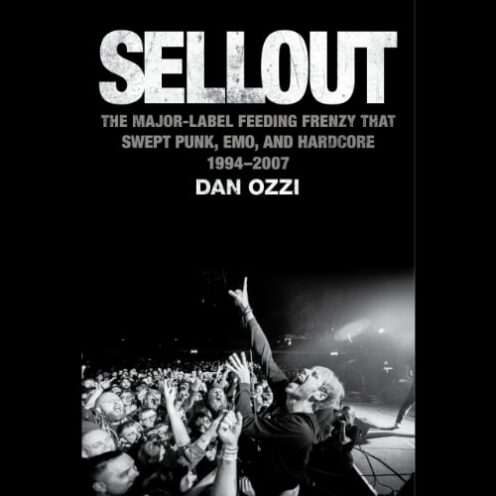
When I last chatted with author Dan Ozzi about his book called Sellout, I asked him, “What does the word “Sellout” mean to you today?” And the author barely blinked by telling me, “Probably nothing!…And so I saw that word still out going around a lot recently, but I don’t see it as much for musicians anymore, because there’s no money in music now, right? How do you sell out?” What I wasn’t expecting from that answer was for Dan Ozzi to be completely on point with his description on the state of the music scene in this comprehensive look at eleven bands’ trajectory into dipping their toes into the major labels’ waters.
The book is carefully and thoughtfully organized into 11 succinct chapters following each of the eleven bands’ major label debuts. As you can imagine from the back cover stating the albums covered in the book, not all of these records were major label success stories. In fact, only a handful of them could be considered to be the record that put those bands on the map and would change their lives for the better (or worse). The book is incredibly entertaining, well-researched and Ozzi lives up to the hype of describing himself as “America’s Only Music Writer.”
As much as I can call myself a near-expert in the genre of punk, emo and hardcore, Dan Ozzi puts my knowledge to shame early and often with intricate interviews from the bands, management, and label heads that tell these stories about where everything went right, or so horribly wrong. Starting the book off with Green Day’s Dookie pays off as a wise choice, as it grabs the reader’s attention from the beginning and spins a tangled web of all of the things that led up Green Day’s handshake agreement to leave Lookout! Records and sign with Warner Brothers. There are little nuggets of information collected throughout Sellout that prove Dan Ozzi is as much as an accomplished writer as he is a historian for this genre of music and time period of the music industry in general.
From the heart-breaking stories of Jawbreaker’s Dear You falling upon the commercially unsuccessful pile, to Jimmy Eat World’s incredibly rarer opportunity to get two chances at a major label success story with Static Prevails and Clarity on Capitol Records, Ozzi never loses focus on the story he’d like to tell his readers. There’s definitely a cautionary theme of “bands beware” of the claws of major labels looking for the next big thing in music, from sending their A&R reps to concerts and sticking out like a sore thumb (because their shirts are tucked into their jeans). Ozzi’s advice for young bands is found between the lines of these tales of music lore and yet he never interjects himself into the book. He’d prefer to be a “fly on the wall” from each concert, each merch table sale, to the sleazy pitches from major label heads telling these rockstars about how they were going to make their wildest dreams come true.
The later chapters of Thursday’s War All the Time to My Chemical Romance’s outlandishly huge Three Cheers for Sweet Revenge pick up tons of insight on where there may have been disconnect between the bands’ expectations for their commercial success (or lack thereof in the case of The Distillers’ Coral Fang) and the record labels’ plans for the future of each of these key acts. The process of “selling out” seems different as each band evolves to the crescendo of their commercial appeal, and Ozzi puts it best in MCR’s case of the band not wanting, “a watered-down, misogynist copycat version of their band stealing all the glory. If anyone was going to make it, it was going to be them.”
Sometimes the circumstances that lead to a band “selling out” are justified when the trajectory of their appeal on an indie label reaches its peak, and they’re looking for a bigger push and resources to help them reach their lofty goals. Other times, the bands get nearly “conned” into these lucrative deals, that really aren’t lucrative at all, and their rockstar dreams are cut short along the way. Dan Ozzi has backed up his claims of being “America’s Only Music Writer” with professional poise and he stays true to the theme of the title, while still painting with vibrant colors to enlighten his audience with has vast research and overall knowledge of the music industry. The book includes some very rare photographs of these bands in the early days, and brings some much needed context into focus of just how young these bands were when making their career decisions. Sellout deserves all of the early accolades and praise that were built up early on in promoting this literature, and Dan Ozzi has knocked his own expectations right out of the park.